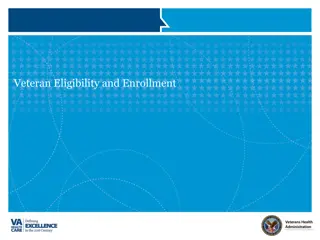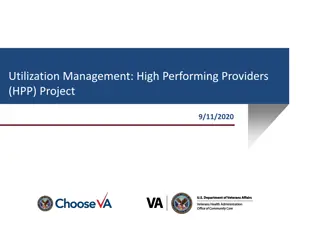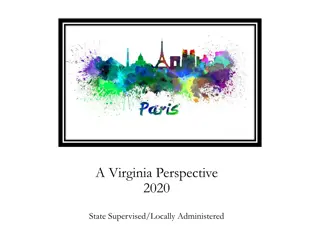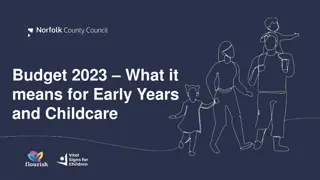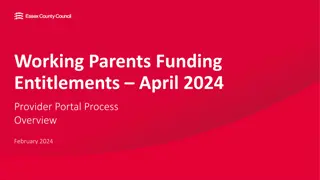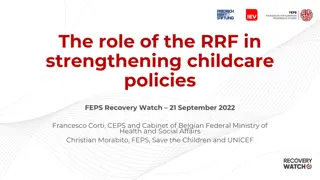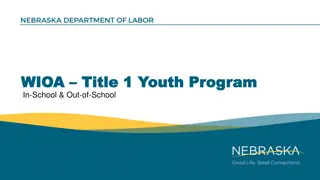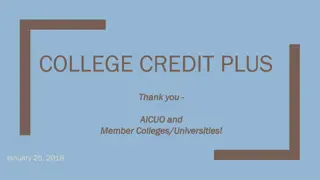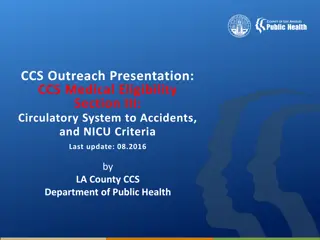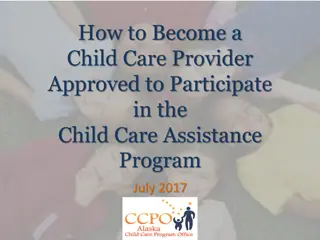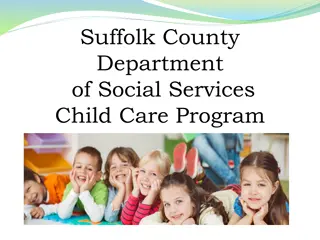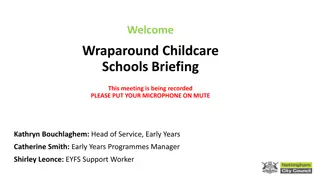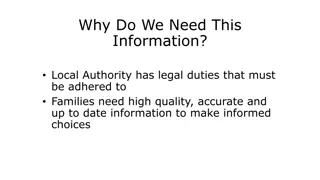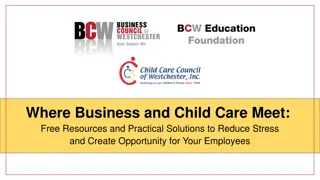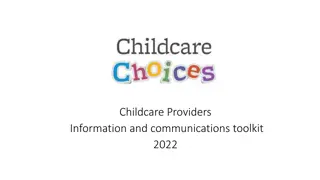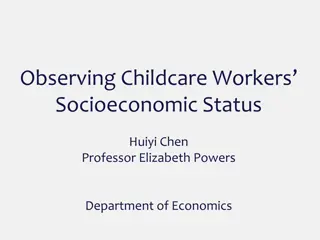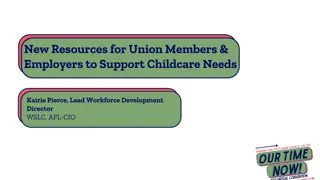Eligibility Criteria for Out-of-School Childcare Providers Offering 30 Hours of Free Childcare
Providers offering out-of-school childcare can register to deliver 30 hours of free childcare if they are on the Early Years Register and meet specific criteria. Eligibility is based on parents' qualifying paid work, income thresholds, and other factors outlined in the statutory guidance. The new EYFS framework provides flexibility for providers offering care exclusively before and after school or during school holidays for younger children. The eligibility checker helps determine entitlement to free hours for two, three, and four-year-olds based on various criteria.
Download Presentation

Please find below an Image/Link to download the presentation.
The content on the website is provided AS IS for your information and personal use only. It may not be sold, licensed, or shared on other websites without obtaining consent from the author. Download presentation by click this link. If you encounter any issues during the download, it is possible that the publisher has removed the file from their server.
E N D
Presentation Transcript
Out of School Childcare providers are eligible to register to deliver 30 Hours of Free Childcare if They are on the Early Years Register They are exempt from registration i.e. schools The newly published revised EYFS Statutory Framework states Providers offering care exclusively before and after school or during the school holidays for children younger than those in the Reception class age range, should continue to be guided by, but do not have to meet, the learning and development requirements. All such providers should discuss with parents and/or carers (and other practitioners/providers as appropriate, including school staff/teachers) the support they intend to offer
The National Picture Early Years and Childcare Statutory Guidance (September 2017) Early Years Funding (April 2017) The Model Provider Agreement
Statutory Guidance Content Part A: Free places for two, three and four year olds Eligibility Flexibility Quality Funding places Part B: Securing sufficient childcare Part C: Information to parents Part D: Information to childcare providers
Eligibility Two year olds Three and four year olds (universal entitlement) Three and four year olds of working parents (extended entitlement) A child will be entitled to the additional free hours from the beginning of the term after the child is three and the child s parent has a current positive determination of eligibility from HMRC
Eligibility Criteria The parent(s) should be in qualifying paid work (set out in regulations). Each parent or the single parent in a lone parent household will need to expect to earn the equivalent of 16 hours at NMW or NLW over the forthcoming quarter Where one or both parents are in receipt of benefits relating to sickness, parenting, caring, incapacity for work or limited capability for work they are treated as though they are in paid work Where a parent is in a start-up period (i.e. they are newly self-employed) they do not need to demonstrate that they meet the income criteria for 12 months in order to be eligible If either or both parents income exceeds 100,000 they will not be eligible for the extended entitlement
Eligibility Checking A new national Eligibility Checker is being developed that will check eligibility for Two year old places 30 Hours places Childcare Tax Credits Early Years Pupil Premium This will also automatically calculate the Grace Period, minimising administrative burdens on local authorities and providers
Childcare Tax Credits Tax Free Childcare will be introduced during 2017. Parents will be able to set up an online account where they can bank payments for childcare. For each 8 a parent pays in, the Government will add an additional 2 up to a maximum of 2,000 per year (up to a maximum of 4,000 for families of disabled children) Tax Free Childcare is being rolled out gradually and will eventually cover all families with children under 12, if they meet the required work and income criteria. There will be an upper income limit per parent of 100,000 and a minimum weekly income level per parent equivalent to 16 hours worked at the NLW Charity run settings requiring a Unique Tax Reference call HMRC Childcare Service Helpline on 0300 123 4097
The Role of JobCentre Plus Once the Eligibility Checking System is in place, JobCentre Plus, in advising parents on employment issues, should be able to also support them in checking their eligibility for 30 Hours of Free Childcare In Kent we have had an early conversation with Job Centre Plus about the potential to support parents by working together in this way
The Grace Period LAs should continue to fund a place for a child whose parents cease to meet the eligibility criteria and ensure that providers are aware of this LAs will be able to access this information via the Eligibility Checking Service, which will automatically encode the Grace Period end date LAs should complete an audit check on eligibility codes at six fixed points in the year, both at half-term and at the end of term across the year LAs should communicate the Grace Period (through providers) to parents who are found to be ineligible for the extended entitlement at the audit check date
The Grace Period Date Parent receives ineligible decision on reconfirmation LA audit date: Grace Period End date: 1 January 10 February 11 February 31 March 11 Feb 31 March 1 April 31 August 1 April 26 May 27 May 31 August 27 May 31 August 1 September 31 December 1 September 21 October 22 October 31 December 22 October 31 December 1 January 31 March LAs should consider extending the Grace Period for a short time in very exceptional circumstances if the parent has been forced to leave their home and paid employment, for example, where the parent is a victim of domestic abuse or other serious crime
Flexibility Local authorities should Encourage providers to offer flexible packages of free hours Not before 6.00am or after 8.00pm With no minimum session length With no session to be longer than 10 hours A maximum of two sites in a single day Ensure that parents and providers are aware that free places can be delivered Over up to 52 weeks of the year Outside of maintained school term times At weekends
Charging Funding is intended to deliver15 or 30 hours a week of free, high quality, flexible childcare. It is not intended to cover the costs of meals, other consumables, additional hours or additional services. LAs should ensure that providers are aware that they can charge for meals and snacks, consumables such as nappies or sun cream and for services such as trips and yoga. These charges must be voluntary for the parent.
Support for children with SEND Disability Access Fund SEN Inclusion Fund Best Practice Guidance being developed to improve the quality of Early Years sections of Local Offers Examples to be published of good practice and effective systems of SEND support for children in their early years
Childcare information for parents Local authorities must Maintain a service that provides information for parents and prospective parents on childcare in their area From September 2017 publish this information electronically on the LA website and update it at a minimum termly on 1 January, 1 April and 1 September During the period 1 April 2017 to 31 August 2017, provide information regarding persons who intend to provide the extended 30 hours entitlement Clearly publish how those without access to the internet or from different groups, including people with special educational needs and disability, can access information
Scope of requirements on providers Local Authorities are required by legislation to limit the requirements they place on any provider to those which ensure places are delivered completely free of charge to parents places are provided flexibly in a pattern which meets the needs of parents that the funding provided is used properly and in accordance with any arrangements made with providers that the provider meets the needs of disabled children those with SEN
Scope of requirements on providers cont effective safeguarding and promotion of welfare of the children that providers actively promote fundamental British values and not promote views or theories as fact which are contrary to established scientific or historical evidence and explanations that the early years provider takes any measures identified in a report from Ofsted to improve the overall effectiveness of the provision are necessary for the effective administration of the arrangements
Early Years Funding Champagne Nurseries, Lemonade Funding (CNLF) CNLF has been looking at ways to challenge the Government over the underfunding of Early Years Free Entitlements A complaint against the Government has been submitted to the Competition and Markets Authority regarding the Government s abuse of its position as the biggest purchaser of childcare The case is that the Government is controlling the price at which providers must sell their services, by legislating that funded places must be given to parents for free , and is also controlling the price at which it buys services by deciding how much to award each LA and by directing the LA as to how much of that money it can retain for its services The CMA route means that the laws around funding should be looked into and is a key step in the right direction in terms of trying to get the law changed to remove the word free and allow the funding to be used as a subsidy
Early Years Funding in Kent In the context of views expressed by providers in the Kent consultation, with effect from the 1 April 2017 KCC has agreed to make the following changes to the Early Years Funding Formula for all providers: Three and Four Year Olds 2016-17 Hourly rates 2017-18 Hourly rates Base Rate 3.91 3.91 (Increasing by 5p to 3.96 from 1 September 2017) 0.01 to 0.90 Deprivation 0.01 to 0.90 Quality QTS 0.90 0.90 Quality QTS/EYPS 0.30 0.30 Quality System Leadership (in Kent, Collaborations) Quality Ofsted n/a tbc 0.05 per hour + 300 lump sum 0.05 No longer applicable Flexibility No longer applicable
Early Years Funding in Kent Funding for 2 year olds From 1 April 2017 an increase of 7p from 4.95 to 5.02 per hour Communication of individual funding rates Each provider has been sent a letter informing them of their individual funding rate for 2017-18 Future intentions It is our intention to further increase the Base Rate in the future as affordability allows. We anticipate that this will be possible from the growth in the take up of the 30 Hours. The amount of the increase and the timing of the increase will depend on the level of take up
Model Provider Agreement Can be implemented from April or from September Not too prescriptive as DfE trying to meet the needs of both providers and local authorities Operational guidance will be published in due course which will be more explicit (We have been asked to continue to attend the Expert Group) We are currently working on the local (Kent) elements of the Model Agreement (including seeking provider views), to be complete late April/early May
30 Hours of Free Childcare The scale of the challenge in Kent Predicted take up of 15 Hours by three/four year olds Autumn 2017 18,723 Spring 2018 24,828 Summer 2018 29,509 Estimated eligibility for 30 hours of Free Childcare Autumn 2017 11,404 children Spring 2018 15,128 children Summer 2018 17,983 children
30 HOURS OF FREE CHILDCARE - KEY PRINCIPLES The Child The child's welfare and well-being are paramount with their differences being welcomed and valued All eligible children should be able to access 30 Hours in quality Early Years provision The needs of children not eligible for 30 Hours should not be compromised The Parent/Carer Parent/Carers should be empowered and supported to: Have high expectations for themselves and their families Access quality childcare for their child(ren) that enables them to work The Child 30 HOURS The Provider The Parent/Carer The Provider Providers should have available to them: Timely accurate information about 30 Hours Services that support sustainability and high quality, inclusive childcare Continuous professional development for their staff
30 Hours of Free Childcare in Kent Project Plan with various work streams Sufficiency Sustainability Promotion and Communication Workforce Development and Maintaining Quality Equality and Inclusion In-house Systems Evaluation
Predicting Demand for 15 and 30 Hour Places Uses a methodology developed by Sheffield City Council to estimate demand for Free Early Education places in three terms in the 2017/2018 Academic Year Demand calculated using a range of sources: GP Data- Eligible 3 & 4 year olds in each term HMRC - Benefit recipients to calculate the proportion of working households Census Data - Households eligible for 30 hours i.e. both parents working, single-parent working households KCC Service Data - Take up and where children travel to access childcare KCC Childcare Survey 2017 Findings
Kent Provider Survey Establishments: 760 Childminders: 612 Total Childcare providers: 1,372 Survey Responses: 502 Response Rate: 37% Are you considering offering the 30 hours of nursery funding when it is implemented for working parents? Yes Not Sure No Don t Know
Kent Provider Survey Establishments: 760 Childminders: 612 Total Childcare providers: 1,372 Survey Responses: 502 Response Rate: 37% What are your reasons for not considering offering the 30 hours of nursery funding when it is implemented for working parents? Reduced revenue/income Lack of staff Facilities/building issues KCC funding unknown Impact on places for FF2 Restrictions with opening hours
Kent Provider Survey Establishments: 760 Childminders: 612 Total Childcare providers: 1,372 Survey Responses: 502 Response Rate: 37% For those that said yes or were not sure, how do you plan to offer the 30 hours funded places? Over 38 weeks Don t know Not applicable Stretched places Over 38 weeks & stretched places
KCC Parents Survey February 2017 739 respondents (90.7%) indicated that they intended to take up some of the extra 15 hours childcare available 471 (64%) 26-30 hours per week 140 (19%) 21-25 hours per week 96 (17%) 16 - 20 hours per week
Models of Delivery 1. 2. 3. To support sustainability For working in partnership The role of collaborations
Models of Delivery 1. Supporting Sustainability Examples Totally free pattern, term time only provision Totally free pattern, year round full day care Totally free pattern, stretched Additional patterns, not stretched Additional patterns, stretched
Model of Delivery example Totally Free Pattern Term time only provision Opening 9.00-15.00 38 weeks per year Provider offers parents 5 full days per week, subject to availability. Provider offers a free lunch or child brings a packed lunch. Child attends 5 full days per week for 38 weeks with no costs attached
Model of Delivery example Stretched Additional Pattern Full day care Open 8.00-18.00 50 weeks per year 24 hours free childcare per week plus 26 hours chargeable for 48 weeks per year. Free childcare is 1140 hours per year. As this is stretched over 48 weeks, the child will be accessing 1152 hours. The additional 12 hours will be chargeable in addition to the remaining 2 weeks. A child attending a full time place each week (50 hours)
Models of Delivery 2. Working in partnership The Government has stated that it anticipates the partnership working will be key in the successful delivery of 30 Hours of Free Childcare and has particularly looked to the Early Implementers to trial and champion this
Models of Delivery 3. The Role of Collaborations Collaborations are a way in which settings and childminders can support each other, share good practice and ideas and purchase training more cost effectively Collaborations may be one way in which you can organise some partnership working between settings and between settings and childminders If you are interested in leading or joining a collaboration, please make sure you complete this section of the Expression of Interest and Evaluation form at the end of the Seminar.
Collaborations North Kent County Dartford Gravesham Sevenoaks Number of collaborations 53 1 1 6 Number of PVI settings in a collaboration 419 26 21 45 Number of childminders in a collaboration 3 0 0 0 % of settings in a collaboration 62% 56.5% 72.4% 63.8%
Collaborations South Kent County Ashford Dover Shepway Number of collaborations 53 5 7 5 Number of settings in a collaboration 419 42 31 44 Number of childminders in a collaboration 3 0 0 0 % of group settings in a collaboration 62% 73.7% 63.8% 80%
Collaborations - West Kent County Maidstone Tonbridge & Malling Tunbridge Wells Number of collaborations 53 5 4 4 Number of settings in a collaboration 419 33 38 39 Number of childminders in a collaboration 3 0 0 3 % of group settings in a collaboration 62% 40% 60% 64.5% *There will soon be a meeting to start a new collaboration in Maidstone
Collaborations East Kent County Canterbury Swale Thanet Number of collaborations 53 5 5 5 Number of settings in a collaboration 419 40 36 24 Number of childminders in a collaboration 3 0 0 0 % of group settings in a collaboration 62% 71.4% 61% 51.1% * A new collaboration should form in Thanet in March
What Kent Collaboration Leaders said about 30 Hours of Free Childcare Collaborations are a positive thing in delivering 30 Hours of Free Childcare We have a strong moral purpose to do this, for our children and families We can work together, sharing ideas and problem solving We can work together to drive down some costs This could be a chance to expand our businesses We are a strong, resilient sector and we can do this



